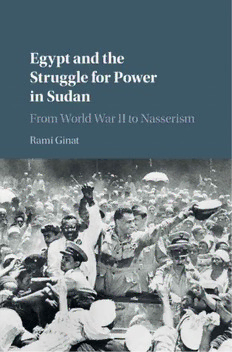
Egypt and the Struggle for Power in Sudan: From World War II to Nasserism PDF
Preview Egypt and the Struggle for Power in Sudan: From World War II to Nasserism
Egypt and the Struggle for Power in Sudan For decades, the doctrine of the Unity of the Nile Valley united Egyptians of a variety of political and nationalist backgrounds. Many Egyptians regarded Sudan as an integral part of their homeland, and thereforebattledtoridtheentireNileValleyofBritishimperialismand unite its inhabitants under the Egyptian crown. Here, Rami Ginat providesavitalandimportantrevisedaccountofthehistoryofEgypt’s colonialiststruggleandtheireffortstoprovecategoricallythattheNile Valleyconstitutedasingleterritorialunit.Thesewereclusteredaround several dominant theoretical layers: history, geography, economy, culture, and ethnography. This book, for both Middle Eastern and African historians, uses a mixture of Arabic and English sources to critically examine the central stages in the historical development of Egypt’s doctrine, concentrating on the defining decade (1943–1953) thatfirstwitnessedboththepinnacleofthedoctrine’sstruggleandthe subsequentshatteringofaconsensualnationalistdream. rami ginat is a professor of Middle Eastern politics and is heading the Department of Political Studies at Bar-Ilan University. He is a leadingscholarinEgyptianhistoryandColdWarpoliticsintheMiddle East,andhaspublishedmanybooksandarticlesinthesefields,includ- ing A History of Egyptian Communism (2011). His work pays careful attentiontothemutualfeedbackbetweenpoliticsandideas. Egypt and the Struggle for Power in Sudan From World War II to Nasserism Rami Ginat Bar-IlanUniversity,Israel UniversityPrintingHouse,CambridgeCB28BS,UnitedKingdom OneLibertyPlaza,20thFloor,NewYork,NY10006,USA 477WilliamstownRoad,PortMelbourne,VIC3207,Australia 4843/24,2ndFloor,AnsariRoad,Daryaganj,Delhi–110002,India 79AnsonRoad,#06–04/06,Singapore079906 CambridgeUniversityPressispartoftheUniversityofCambridge. ItfurtherstheUniversity’smissionbydisseminatingknowledgeinthepursuitof education,learning,andresearchatthehighestinternationallevelsofexcellence. www.cambridge.org Informationonthistitle:www.cambridge.org/9781107197930 DOI:10.1017/9781108181952 ©RamiGinat2017 Thispublicationisincopyright.Subjecttostatutoryexception andtotheprovisionsofrelevantcollectivelicensingagreements, noreproductionofanypartmaytakeplacewithoutthewritten permissionofCambridgeUniversityPress. Firstpublished2017 PrintedintheUnitedKingdombyClays,StIvesplc AcataloguerecordforthispublicationisavailablefromtheBritishLibrary. LibraryofCongressCataloging-in-PublicationData Names:Ginat,Rami,author. Title:EgyptandthestruggleforpowerinSudan:fromWorldWarIIto Nasserism/RamiGinat,Bar-IlanUniversity,Israel. Description:Cambridge,UnitedKingdom:CambridgeUniversityPress, 2018.|Includesbibliographicalreferencesandindex. Identifiers:LCCN2017013415|ISBN9781107197930(hardback:alk.paper) |ISBN9781316647929(pbk.:alk.paper) Subjects:LCSH:Egypt–Foreignrelations–Sudan.|Sudan–Foreign relations–Egypt.|Sudan–Foreignpublicopinion,Egyptian.|WorldWar, 1939-1945–Territorialquestions–Egypt.|Imperialism.|Egypt–Politicsand government–1882-1952.|Sudan–Politicsandgovernment–1899-1956. Classification:LCCDT82.5.S8G562018|DDC327.62062409/045–dc23LC recordavailableathttps://lccn.loc.gov/2017013415 ISBN978-1-107-19793-0Hardback CambridgeUniversityPresshasnoresponsibilityforthepersistenceoraccuracy ofURLsforexternalorthird-partyinternetwebsitesreferredtointhispublication anddoesnotguaranteethatanycontentonsuchwebsitesis,orwillremain, accurateorappropriate. For Lydia, Richard, and the staff of Pennyhooks Farm Contents Listof Tables page viii Acknowledgments ix Introduction 1 Part I The Theoretical Foundations of Egypt’sClaims for theUnity of the Nile Valley 17 1 Egyptian Perceptions ofSudan: Historical Narratives 19 2 TheUnity of the Nile Valley:Geographical, Economic, and Ethnographical Perspectives 61 Part II TheStruggle for Sudan:Politics, Diplomacy, and Public Discourse 87 3 TheSudan Question: TheEgyptian Transition from Wartime Lethargyto Postwar Overtures and Deeds 89 4 Between Two ModesofImperialism:Education, Nationalism, and the Struggle for Powerin Sudan 129 5 TheAftermath ofthe SecurityCouncil Hype: Whither the Unity ofthe Nile Valley? 178 6 SocialMovements and the Sudan Question: ACase Study in the Divergence of National LiberationMovements 208 Conclusion 251 Bibliography 259 Index 273 vii Tables 4.1 Student Enrollment and Graduation, 1938–1946 page 152 4.2 Figures ofPupils in Non-Government Schools, 1933–1946 164 4.3 Figures ofPupils in Government Schools 166 6.1 Survey among Students and Faculty ofFu’ad IUniversity 222 viii Acknowledgments Studying the modern history of the Nile valley, let alone the ways its peoples perceived it, requires a thorough study in Egypt – the “gift of the Nile” – and in many other archives and libraries scattered in several countries located on four continents. It is my pleasure to acknowledge the generosity and assistance extended to me throughout my research work by the personnel of the archives and libraries cited in the book’s bibliography. This prolonged study could not have been carried out without the generous research grants (390/08 and 1001/12) extended to me by the Israel Science Foundation (ISF), and I thank them for that. St. Cross CollegeoftheUniversityofOxfordhostedmethroughoutmysabbatical year (2015–2016) during which I completed my book. I would like to thank the college and its staff for their kind hospitality, particularly my friend and colleague Stanley Ulijaszek who sponsored me there. I also would like to thank my friends and colleagues in the Department of Political Studies, Bar-Ilan University, for their thoughtfulness. Special thanks to Amikam Nachmani for his friendship and kindness. I have profited significantly from the benevolence and assistance of many people, and it is a great pleasure to thank them for that. Special thankstothelate‘Abdal-Hamid‘Uthmanwhoassistedmeintheinitial stages of my research work in Egypt. I was deeply saddened by his untimely death in early 2013. I also would like to acknowledge the assistance extended to me by my friend Ursula Wokoeck in the later stage of my study. Her remarks and comments were constructive and instructive. My friend Asaf Maliach was very helpful throughout, and DimaCourseandJesseWeinberghelpedalongtheway.Ialsowouldlike to include my friends and colleagues Israel Gershoni and Haggai Erlich ofTel-AvivUniversity,andYehuditRonenofmydepartmentforsharing their knowledgewith me. It has been a pleasure working with Maria Marsh and Cambridge University Press. Maria guided me patiently and diligently throughout the process of publication, and I thank her for that. I also thank the ix
